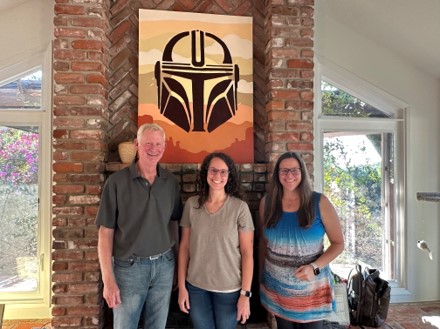MSU Extension leaders reimagine the future of Extension and its impact on the nation’s health in new book
Written and edited by passionate, visionary scholars, this newly published book envisions a bold future for Extension’s role in community-based healthcare.

Imagine if healthcare didn’t just happen in hospitals and clinics, but was woven into our everyday lives, in the heart of our communities — and that the Cooperative Extension System was the driving force leading transformations in human health, just as it did for agricultural practices over 100 years ago.
In the new book “Health Extension: Community-Based Healthcare and the Future of Cooperative Extension,” experts from Michigan State University Extension explore just that, as well as how innovative thinking could transform healthcare across the country.
The book, which is out now with Michigan State University Press, was heavily shaped by experts from MSU Extension, long known for its leadership and impact in the area of community health.

Across ten chapters, “Health Extension” envisions a broader role for Extension in community-based healthcare — from how Extension can support mental health in agriculture to community-based approaches to addressing opioid misuse. The volume's contributors are a talented group of intellectual and administrative leaders, researchers, and Extension professionals in varying roles and disciplines, who have been involved in the national Health Extension conversation and movement.
Cheryl Eschbach, director of Michigan State University Extension’s Health and Nutrition Institute, authored several chapters and served as lead editor for the volume.
“These authors challenge the status quo of today’s higher education academies,” she said. “This book showcases the incredible potential of the Cooperative Extension System to improve community health in ways that go beyond traditional methods, giving us a powerful foundation for real change.”
Eschbach edited “Health Extension” alongside fellow editors Jeff Dwyer, professor emeritus and director emeritus of MSU Extension, and Elizabeth Weybright of Washington State University. Within the book, Dwyer and Eschbach explore several strategies for Health Extension, based on successful interventions and programs implemented in Michigan over the last decade while in their respective roles at the university. This work includes collaborations with MSU’s College of Human Medicine.
Additionally, the volume features a chapter by Josh Gunn, associate director of MSU Extension’s Community, Food and Environment Institute, on how Health Extension can shape disaster preparedness, response, and recovery education. MSU Extension community behavioral health specialist Lauren Kennedy also co-authored chapters on health equity and justice — something Eschbach points to as the heart of future transformation in our healthcare delivery models.
“Health equity is the systemwide core value being described and promoted in this volume to transform higher education and engaged Extension scholarship in communities,” Eschbach said.
For more than a century, MSU Extension has served a unique role in Michigan communities, promoting wellness through programs in nutrition, agriculture, and consumer education. Now, as outlined in the book, MSU Extension leaders believe it’s time for a new era — one where Cooperative Extension can better bridge healthcare gaps in new ways and promote well-being across urban and rural areas alike.
“This work represents a movement toward community-engaged research and practice,” said Eschbach. “This movement is about shifting from just helping individuals to also working with systems and policies. By doing this, we can make changes in the community that support healthy choices as the easiest choices in everyday life and call for urgent action and systems change in higher education outreach to accomplish these goals.”
This book is part of a broader series launched in 2010 called “Transformations in Higher Education: The Scholarship of Engagement,” which explores the impact and processes of university-community partnerships. Each volume covers topics like community-based research, civic engagement and public scholarship, focusing on how universities can work alongside communities to drive meaningful change.
While “Health Extension” will be of particular interest to readers interested in American history and social justice movements, anyone looking to learn about the history of Cooperative Extension and ways to improve community-based healthcare will gain a wealth of knowledge.
Louise Parker, Extension faculty emerita from Washington State University, praised “Health Extension” as “a bold vision and detailed roadmap” that brings together Extension program areas with a strong foundation of health equity and justice.
“Health Extension: Community-Based Healthcare and the Future of Cooperative Extension” is available through MSU Press now and retail outlets on December 1. To learn more about MSU Extension’s health programming, visit MSU Extension’s Food & Health website.



 Print
Print Email
Email

